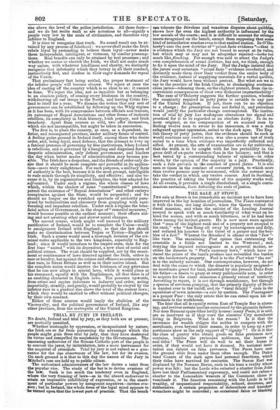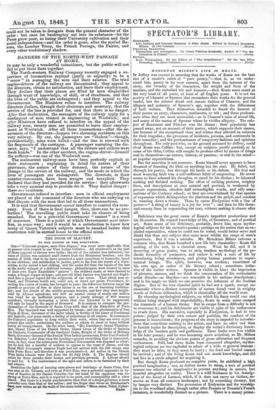THE SALE AT STOWE.
THE sale at Stowe is too remarkable an incident not to have been improved in the lay homilies of journalism. The Times contrasted it with the time, not long distant, when the Queen visited the ducal mansion, and when the satirist of the Leading Journal seemed to speak with as much familiarity of what went on be- hind the scenes, and with as much bitterness, as if he had been there among the invited guests. He is now most stern against that "man of the highest rank and of a property not unequal to his rank," who "has flung all away by extravagance and folly, and reduced his honours to the tinsel of a pauper and the bau- bles of a fool." Whereat the Standard is aflame at this "Jew "- like view. The moralizing Post opines that outrunning the constable is a foible not limited to the West-end ; and, denying the imputed extravagance as a personal matter, as- cribes the disaster to "Peel's currency laws," which have re- duced the prices of the land's produce and redoubled the burden on the landowner's property. Peel is to the Post what " the cat" is to the unlucky servant. Our contemporaries, however, do not deal with the cause to which the disaster is popularly assigned— an inordinate greed for land, inherited by the present Duke from his father—a desire to grasp at every purchaseable acre, in order to acquire for the ducal demesnes a princely extent of territory. According to report, it is not through munificence, but through a species of covetous grasping, that the princely dignity of Stowe is handed over to the bailiff, and its "rural felicity" ends in the squalidest of town miseries—a sale by auction. The Plantagenet is a pauper Peer : the only estate that he can entail upon his de- scendants is the workhouse.
The hint that all is equally rotten East of Temple Bar is alarm- ing, and revives certain qualms occasioned by the gigantic failures. Nor does Rumour spare other lordly houses: many Peers, it is said, are as insolvent as if they were the absentee City merchants living in Belgravia. What is the reason ? Is it that the reverence for wealth obliges the nobles to compete with the merchants, even beyond their means, in order to keep up a pro- portionate show as the only support of "dignity "? Or is it that the class of gentry who obtain goods on false pretences now contains, besides the pretended noblemen, the bearers of real titles ? The Peers will do well to set their house in order, if they would not have it doomed. No national insti- tution can subsist on false pretences. The Peers have seen the ground slide from under them often enough. The Dukes tend Counts of the dark ages had personal functions, which their titles have survived for centuries. The Saxon Earl was displaced by the Norman Baron, each in his time a reality whose power was felt: but the Lords who extorted a charter from John have lost their Parliamentary supremacy, and could not refuse a charter to the Lancashire weavers if the Commons chose to vouchsafe it. The function remaining with the Lords is to be wealthy, of unquestioned respectability, refined, decorous, and deliberative. A certain proportion of debauchees and knocker- wrenchers might be conceded ; an occasional felon or blackleg could not be taken to derogate from the general character of the order : but once let bankruptcy eat into its substance—let the Peers grow poor, so losing their University cultivation and their social independence—and the order is gone, after the mailed Ba- rons, the Lumber Troop, the French Peerage, the Fairies, and every other traditionary shadow.



























 Previous page
Previous page